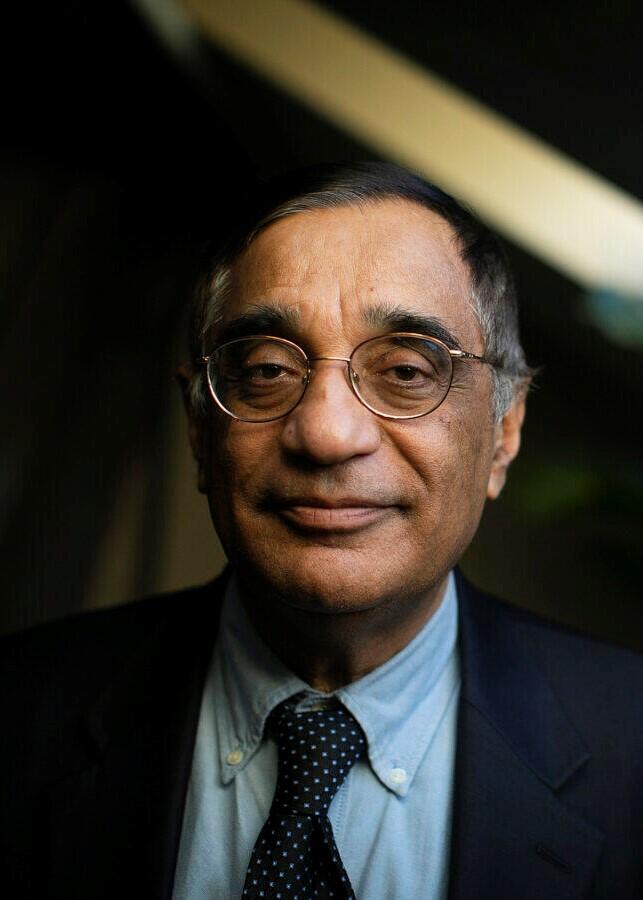Ali Asani named Director of Alwaleed Islamic Studies Program
Islamic Studies Today 2010
Ali Asani Named Director of Alwaleed Islamic Studies Program
Ali Asani, Murray A. Albertson Professor of Middle Eastern Studies and Professor of Indo-Muslim and Islamic Religion and Cultures, directed the Prince Alwaleed bin Talal Islamic Studies Program from 2010 to 2016. Professor Asani was born and raised in Nairobi, Kenya and came to the United States to attend Harvard College, where he pursued a concentration in the Comparative Study of Religion and graduated summa cum laude in 1977. He continued his graduate work at Harvard in the Department of Near Eastern Languages and Civilizations (NELC), receiving his Ph.D. in 1984. Professor Asani holds a joint appointment between the Committee on the Study of Religion and NELC and serves on the faculty of the Departments of South Asian Studies and African and African American Studies. He has taught at Harvard since 1983, offering instruction in a variety of South Asian and African languages and literatures as well as courses on various aspects of the Islamic tradition. Under Professor Asani’s leadership, the Alwaleed Program expanded its programming in outreach and arts and culture in Muslim societies around the world.
Transcript
Rethinking Islam Through the Arts
Ali Asani
For me, of course, I think that the globalization is important but for my own work I've been more conscious of the role that, to help people understand Islam is not all text based. You know, moving away from the written text and looking at the different ways in which people experience religion, you know, experiential. So you know, the role that the sound arts and the visual arts and the literary arts play in the day to day experience of Islam. So, for instance, many people experience the Quran as a recited text, you know, work that Bill Graham has done, and the discourse within the tradition of how the aesthetic of the text, the beauty of the text, you know, get connected with the sacred, but then how people see that as a way in which you relate to the transcendent is through aesthetics, and beauty and beauty is a sign of divine manifestation. And those kinds of notions, I think, are very important and very often underplayed. So, I started teaching a course, it's an introduction to Islam, totally done through that perspective. I've called it "Multisensory Religion: Rethinking Islam through the Arts," and it's really taking this notion of, "God is beautiful and loves beauty," and then see how this unfolds in different Muslim cultures around the world. So even that is global and I look at how it appears in the qawwali in South Asia or some verses of West African, genres of West African poetry or in Indonesia, and I bring it up to the modern period because I do feel, this is something that I picked up actually from some of the work of Mohammed Arkoun, where he talked about this notion of the silent Islam, the Islam of the believer that often is, he called it silent because it's not represented in the academy. It's not represented in the social media or the political media, which focuses so much on what he called, has been called the loud Islam, and that occupies the spaces, but these other forms and these other expressions of Islam which are embedded in forms that sometimes we wouldn't even think about looking at, this is where religion is located, but it is located there, not just in the text. But trying to introduce students to that way of thinking about Islam and then trying to get them to express their learning through engaging in art making, on their own part. So, you know, thinking about the arts as a form of knowledge, but also the arts as a form of learning. So, compose a poem, design, come up with a calligraphy and explain what you've done, things like that, for me, has become very important, at least in the way that I'm teaching. I think maybe the seeds that maybe Annemarie Schimmel sort of sowed in me about the importance of the arts and literature have actually started to really sort of, I don't know, I like to think maybe blossom now because I'm just so fascinated with this.

